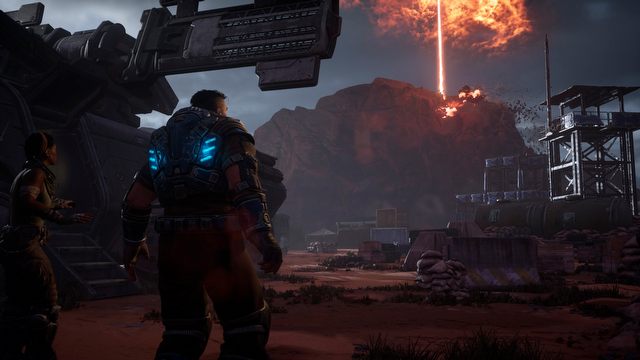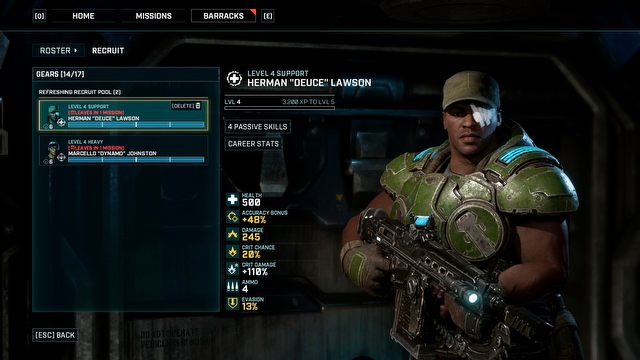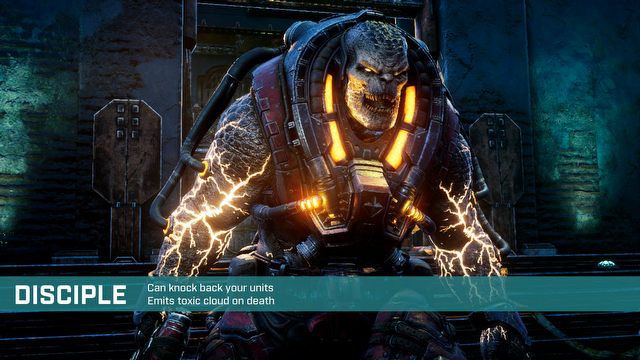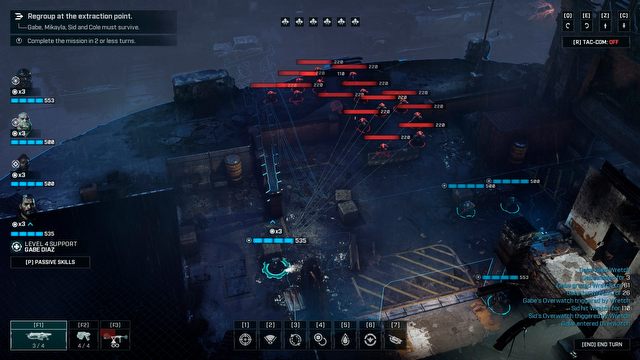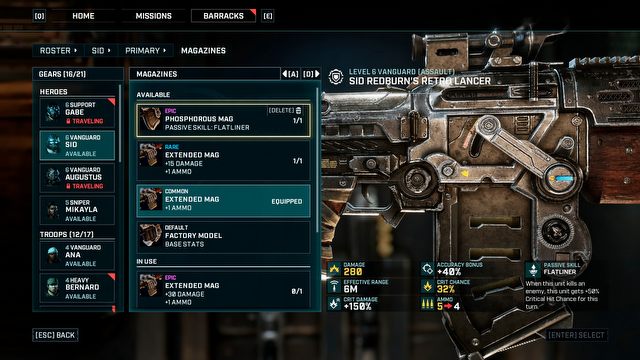Gears Tactics Review – Tactical Strategy for Dummies
The Gears of War series just got a new entry, but this time, we don't pull the trigger – we tell others when to do it and who to shoot at. How do you make a strategy out of a shooter?
The review is based on the PC version.

We're going through some pretty lean years when it comes to new releases – unless you're a fan of strategy games. In that case, you just have got two very similar games: XCOM: Chimera Squad and Gears Tactics. The former is a member of a classic series of tactical games that the spin-off from the Gears of War series emulators – oddly enough, this rather outlandish game was announced two years ago, while the new XCOM was released merely two weeks after its announcement in mid-April. The studios responsible for the new Gears (Splash Damage and The Coalition) have spent the two years carefully studying the classics. I wouldn't say the student necessarily surpassed the master here, but it's definitely worth to give this game some attention, and it's a great introduction to this, rather niche genre.
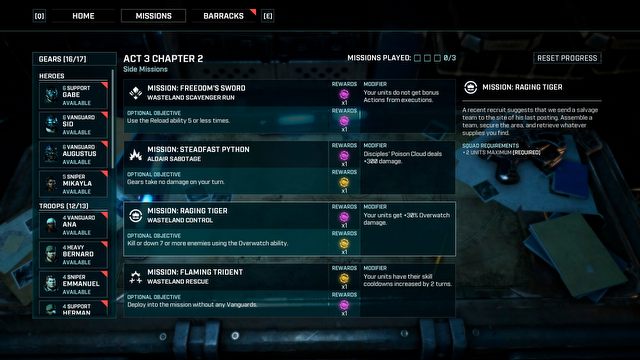
Right at the end of the game, we're forced to complete a set of "side" missions to be able to push the story forward.
A pursuit in three acts
- perfect as the first exposure to the genre;
- the game can surprise you more than once;
- elaborate character development – even within a single class you can create vastly different soldiers;
- proven gameplay mechanics with several improvements;
- great and demanding boss fights – it's a shame there are so few of them;
- solid plot – very important for fans of Gears;
- surprisingly dynamic and eventful fights;
- great audiovisual setting;
- clean interface.
- side missions are mere fillers, but you can't skip them;
- technical errors, including crashing to desktop.
The most important component of Gears Tactics is the campaign, which, at standard difficulty level, will take about 25 hours to complete. That's a lot when you consider the fact that the game does not offer any strategic module, and missions are executed in a specific order, one by one. In total, we get three acts depicting the pursuit of the mysterious Ukkon. Each contains eight scenarios, and larger episodes always end with a mandatory and relatively difficult boss fight. Between missions, we spend time managing the soldiers' equipment, developing their skills, and possibly playing with cosmetic items. We can customize the appearance of soldiers, armors and weapons. It's nothing extraordinary, but it's enjoyable.
Since there's no strategic module, the game seems quite shallow at first glance – fortunately, the developers made efforts to change that, and the game offers varied challenges and maps with numerous enemies. The hostile army is reinforced by new units virtually until the end of the campaign, with act one and two being particularly abundant with them.
These enemies can completely change the shape of the battle, bringing with them new tactical capabilities. A boomer, for example, is equipped with a deadly grenade launcher, able to flush us out from behind the cover, and the pesky tickers can get close in even during our turn. The developers deserve high praise for exerting a great diversification in designing the enemies, and I was often surprised by their abilities. This impression, as I mentioned, fades away in act three, where all these creatures come at us with full force, so there's not much time to admire nuanced character design.
Gears of XCOM
The resemblance to the XCOM games (those developed by Firaxis Games, of course) is striking. Our team consists of four soldiers, and the game uses a standard system of action points, which we spend on, well, actions – shooting, moving, and using special skills unlocked on the character tree. The developers of Gears Tactics quite blatantly ripped the entire system of information about cover quality from XCOM –it looks the same, so fans of that series should instantly feel at home. The interface is generally very legible, and fans of excel tables can activate a special overlay that displays all the hit modifiers in detail – useful when making a decision whether to attack or not.
This obviously is a turn-based game, and there's nothing that would force us to make hasty decisions, but the pace is generally quite high. This is partly due to the fact that there's a ton of enemies, some of whom wait in ambushes, or deploy to the battlefield in the least expected moment. Gears Tactics likes to keep you on the edge of the seat – you can never be certain whether the fragment of the map you've previously cleared won't be riddled with enemies again in a few minutes.
Hence, the game strongly favors the overwatch mode, allowing our soldiers to fire at opponents during their turn, as long as they are within the field of view. GT does not apply any penalties – the mode can be engaged even after performing a few actions, as long as there are enough free APs. This sometimes actually is the only viable method of stopping the deluge of enemies, who make up in numbers what they don't have in intelligence.
Another significant element of the game is the emphasis placed on the team's composition. In addition to the characters important to the plot (called the heroes), the team is supplemented with recruits who also gain experience and new skills. The heroes can actually die during missions, but it's not something that happens often. Gears Tactics is very forgiving. Fallen comrades have one chance per mission to self-revive; otherwise, they can be picked up by their teammates. Even when on their last breath, our soldiers can crawl a short distance to safety, and there await help. So as long as you're not playing on the hardest difficulty, you really have to try hard to lose anyone for good.
The army will make you a man
Soldiers are divided into classes, and these determine both the weapons and skills that can be used and learned. Let's spare a few words on character development – entering the game, I was surprised at how few XP my team would get. Specialization is a necessity, and even a few characters of the same class can have a completely different skill set.
You obviously end up caring for the heroes the most, but making sure the grunts are doing ok is pretty much mandatory. This is because we cannot use all our best soldiers in every fight, and when you delegate a character to a side mission, you can't use them in another. By the end of the campaign, you will certainly have learned to juggle the team members around. Here, we can observe another good design decision: you can freely assign weapon mods to less experienced soldiers – you can even do it right at the departure screen before a mission, and return the upgrades to their proper owners once the mission's over.
The game is definitely missing a strategic module that'd let you research technologies or manufacture goods, and Gears Tactics is trying to make up for it with more extensive character development. Even simple upgrades of the equipment have to be obtained by meeting additional mission objectives or accessing caches scattered around the maps.
The story is very linear, and this may be considered a big drawback, especially for players raised on XCOMs. Story missions are completed in a very specific order and there's nothing random about them. The authors have tried to diversify the campaign with side missions, but these are rather irritating because... you have to complete them.
Initially, this isn't hugely problematic, since we can arbitrarily choose a single mission to complete and thus push the story forward, but in towards the end of the adventure, we already need to complete three such missions, which is all the more painstaking that they are all very repetitive. Escape a bombing raid, protect two stations, free prisoners, or just kill the enemies guarding a base – over and over again. This had been so irksome, in fact, that it compelled me to lower the game's overall score. These missions are completely redundant fillers and, on top of that, they're downright annoying – you're inches away from the grand finale, but you still need to complete some absolutely synthetic activities.
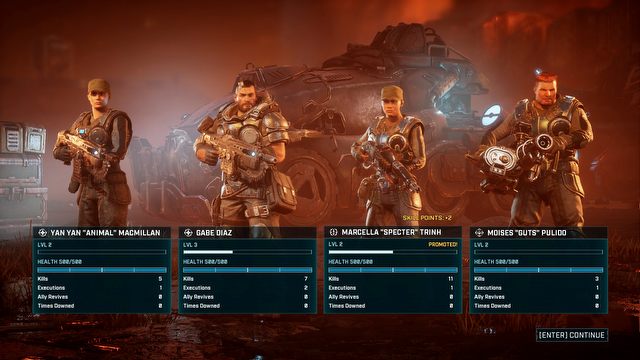
The team usually consists of four soldiers – there are missions, where we have just one character, too.
BUGS AND CRASHES
Gears Tactics could definitely use some technical polish. The game occasionally crashed to desktop, enemy movement was sketchy with stuff like looping animations and collision detection that was at best amusing. The first patch, released a good few days ago, addressed some of these issues – we already have been playing Gears Tactics for about three weeks, so a release-day patch is likely.
Tactical game for the reluctant
All in all, Gears Tactics is thoroughly enjoyable. It offers great, surprisingly intense fun, and you're guaranteed to spend more time with it that you'd think; yes, it is linear, but the subsequent missions make it worth it. Huge credit to the designers for the fantastic interface – it works great, and that's emphatically important in this kind of a game. This doesn't mean the game requires absolutely no getting used-to, but it's counter in minutes, rather than hours – navigating all the menus becomes instinctive after half an hour or so. If it wasn't for the irritating third act, the score would easily be even higher, especially since Gears Tactics has some great production values. Cut-scenes are very good, the soundtrack as well; audio-visual setting overall is pretty much flawless.
At the same time, this game requires the right mindset. If you're looking for an experience to match the original UFO or Terror from the Deep then be warned: this game is even less extensive than the latest entries of XCOM – a veteran of the genre should bear that in mind. Gears Tactics seems much more like the perfect introduction to turn-based strategies, a more approachable alternative for those, who wouldn't usually play tactical strategy. . And honestly, this is a huge advantage for a game in this particular setting. There's surely plenty of people who will appreciate the story simply because it's set in the universe of Gears.
ABOUT THE AUTHOR
I have been playing tactical games pretty much since 1994, when I first played UFOs: Enemy Unknown – Terror from the Deep is my all-time favorite of this genre. I played most of the entries in the series, including these from Altar Interactive.
Completing Gears Tactics took me some 26 hours.
DISCLAIMER
We received a review copy of the game from Microsoft – big up.
Gears Tactics
Gears Tactics Review – Tactical Strategy for Dummies
The Gears of War series just got a new entry, but this time, we don't pull the trigger – we tell others when to do it and who to shoot at. How do you make a strategy out of a shooter?

